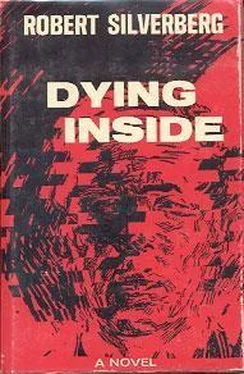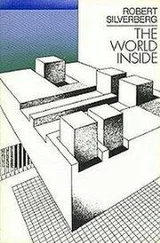* * *
“As the truest society approaches always nearer to solitude, so the most excellent speech finally falls into silence. Silence is audible to all men, at all times, and in all places.” So said Thoreau, in 1849, in A Week on the Concord and Merrimack Rivers. Of course, Thoreau was a misfit and an outsider with very serious neurotic problems. When he was a young man just out of college he fell in love with a girl named Ellen Sewall, but she turned him down, and he never married. I wonder if he ever made it with anybody. Probably not. I can’t imagine Thoreau actually balling, can you? Oh, maybe he didn’t die a virgin, but I bet his sex life was lousy. Perhaps he didn’t even masturbate. Can you visualize him sitting next to that pond and whacking off? I can’t. Poor Thoreau. Silence is audible, Henry.
* * *
I imagine, as I near Judith’s building, that I meet Toni in the street. I seem to see a tall figure walking toward me from Riverside Drive, hatless, bundled up in a bulky orange coat. When we are half a block apart I recognize her. Strangely, I feel neither excitement nor apprehension over this unexpected reunion; I am quite calm, almost unmoved. At another time I might have crossed the street to avoid a possibly disturbing encounter, but not now: coolly I halt in her path, smile, hold up my hands in greeting. “Toni?” I say. “Don’t you know me?”
She studies me, frowns, seems puzzled for a moment. But only a moment.
“David. Hello.”
Her face looks more lean, the cheekbones higher and sharper. There are some strands of gray in her hair. In the days when I knew her she had one curious gray lock at her temple, very unusual; now the gray is scattered more randomly through the black. Well, of course she’s in her middle thirties now. Not exactly a girl. As old now, in fact, as I was when I first met her. But in fact I know she has hardly changed at all, only matured a little. She seems as beautiful as ever. Yet desire is absent from me. All passion spent, Selig. All passion spent. And she too is mysteriously free of turbulence. I remember our last meeting, the look of pain on her face, her obsessive heap of cigarette butts. Now her expression is amiable and casual. We both have passed through the realm of storms.
“You’re looking good,” I say. “What is it, eight years, nine?”
I know the answer to that. I’m merely testing her. And she passes the test, saying, “The summer of ’68.” I’m relieved to see that she hasn’t forgotten. I’m still a chapter of her autobiography, then. “How have you been, David?”
“Not bad.” The conversational inanities. “What are you doing these days?”
“I’m with Random House now. And you?”
“Freelancing,” I say. “Here and there.” Is she married? Her gloved hands offer no data. I don’t dare ask. I’m incapable of probing. I force a smile and shift my weight from foot to foot. The silence that has come between us suddenly seems unbridgeable. Have we exhausted all feasible topics so soon? Are there no areas of contact left except those too pain-filled to reopen?
She says, “You’ve changed.”
“I’m older. Tireder. Balder.”
“It isn’t that. You’ve changed somewhere inside.”
“I suppose I have.”
“You used to make me feel uncomfortable. I’d get a sort of queasy feeling. I don’t any more.”
“You mean, after the trip?”
“Before and after both,” she says.
“You were always uncomfortable with me?”
“Always. I never knew why. Even when we were really close, I felt—I don’t know, on guard, off balance, ill at ease, when I was with you. And that’s gone now. It’s entirely gone. I wonder why.”
“Time heals all wounds,” I say. Oracular wisdom.
“I suppose you’re right. God, it’s cold! Do you think it’ll snow?”
“It’s bound to, before long.”
“I hate the cold weather.” She huddles into her coat. I never knew her in cold weather. Spring and summer, then goodbye, get out, goodbye, goodbye. Odd how little I feel for her now. If she invited me up to her apartment I’d probably say, No, thank you, I’m on my way to visit my sister. Of course she’s imaginary; that may have something to do with it. But also I’m not getting an aura from her. She’s not broadcasting, or rather I’m not receiving. She’s only a statue of herself, like the cats in the alleys. Will I be incapable of feeling, now that I’m incapable of receiving? She says, “It’s been good to see you, David. Let’s get together some time, shall we?”
“By all means. We’ll have a drink and talk about old times.”
“I’d like that.”
“So would I. Very much.”
“Take care of yourself, David.”
“You too, Toni.”
We smile. I give her a little mock-salute of farewell. We move apart; I continue walking west, she hurries up the windy street toward Broadway. I feel a little warmer for having met her. Everything cool, friendly, unemotional between us. Everything dead, in fact. All passion spent. It’s been good to see you, David. Let’s get together some time, shall we? When I reach the corner I realize I have forgotten to ask for her phone number. Toni? Toni? But she is out of sight. As though she never was there at all.
* * *
It is the little rift within the lute,
That by and by will make the music mute,
And ever widening slowly silence all.
That’s Tennyson: Merlin and Vivien. You’ve heard that line about the rift within the lute before, haven’t you? But you never knew it was Tennyson. Neither did I. My lute is riven. Twang. Twing. Twong.
Here’s another little literary gem:
Every sound shall end in silence, but the silence never dies.
Samuel Miller Hageman wrote that, in 1876, in a poem called Silence. Have you ever heard of Samuel Miller Hageman before? I haven’t. You were a wise old cat, Sam, whoever you were.
* * *
One summer when I was eight or nine—it was before they adopted Judith, anyway—I went with my parents to a resort in the Catskills for a few weeks. There was a daycamp for the kiddies, in which we received instruction in swimming, tennis, softball, arts crafts, and other activities, thus leaving the older folks free for gin rummy and creative drinking. One afternoon the daycamp staged some boxing matches. I had never worn boxing gloves, and in the free-for-alls of boyhood I had found myself to be an incompetent fighter, so I was unenthusiastic. I watched the first five matches in much dismay. All that hitting! All those bloody noses!
Then it was my turn. My opponent was a boy named Jimmy, a few months younger than I but taller and heavier and much more athletic. I think the counselors matched us deliberately, hoping Jimmy would kill me: I was not their favorite child. I started to shake even before they put the gloves on me. “Round One!” called a counselor, and we approached each other. I distinctly heard Jimmy thinking about hitting me on the chin, and as his glove came toward my face I ducked and hit him in the belly. That made him furious. He proposed now to clobber me on the back of the head, but I saw that coming too and stepped aside and hit him on the neck close to his adam’s-apple. He gagged and turned away, half in tears. After a moment he returned to the attack, but I continued to anticipate his moves and he never touched me. For the first time in my life I felt tough, competent, aggressive. As I battered him I looked past the improvised ring and saw my father flushed with pride, and Jimmy’s father next to him looking angry and perplexed. End of round one. I was sweating, bouncy, grinning.
Round two: Jimmy came forth determined to knock me to pieces. Swinging wildly, frantically, still going for my head. I kept my head where he couldn’t reach it and danced around to his side and hit him in the belly again, very hard, and when he folded up I hit him on the nose and he fell down, crying. The counselor in charge very quickly counted to ten and raised my hand. “Hey, Joe Louis!” my father yelled. “Hey, Willie Pep!” The counselor suggested I go over to Jimmy and help him up and shake his hand. As he got to his feet I very clearly detected him deciding to butt me in the teeth with his head, and I pretended to be paying no attention, except when he charged I stepped coolly to one side and banged my fists down on his lowered back. That shattered him. “David cheats!” he moaned. “David cheats!”
Читать дальше












